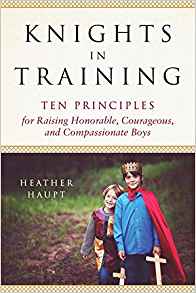KNIGHTS IN TRAINING by Heather Haupt (Book Excerpt)

(Photo credit: Savanna Lee)
How Do We Cultivate Compassion?
Provide Stability
Although the seeds of empathy are in each of our children, careful cultivation is needed. We do this by providing children with a stable, nurturing home and relationships. When their needs are met, they are more likely to rise to meet the needs of others because it has been modeled to them. We help them develop compassion by reading to them. We see that the number of stories preschoolers hear predict their ability to understand the emotions of others and that adults who read less fiction also appear to be less empathetic as well.3 Talking to our kids in the everyday moments of life allows us to build an awareness for the needs of others. Giving our children time to play so they can practice this kind of rescuing, protecting, and defending in a safe, relaxed atmosphere helps them internalize these values.
Inspire Them with a Sense of Purpose
We cultivate compassion by casting vision and filling their minds with a sense of purpose. Being brave, being strong does not just happen when they “fight the bad guys.” It happens when they spot any kind of need and step in to help. Our boys have the opportunity each and every day to be a hero to someone. What is a hero? It is simply an average person doing the extraordinary thing of putting the needs of others before his own safety or comfort. It entails taking risks in his effort to problem solve. In other words, this involves doing what our boys are wired to do so well! As they become aware of their surroundings and the needs of others, they have opportunities to take action.
Inspire Them to Lead the Way
Taking up the mantle of knighthood means being a leader. A knight does not wait for others to take action, he inspires others to follow him as he steps in and leads the way toward helping those around him. Our knights in training need to be reminded of the power of the bystander effect. Human nature stands by, watching and waiting for direction. This diffusion of responsibility can have serious effects when individuals are not motivated to take action. But our boys are not average people. They are defenders and protectors of humanity. They are never passive watchers but rather are men of action who quickly take stock of the situation and step in to help.
Inspire Them by Recognizing and Valuing Their Strength
Boys beam when we recognize and appreciate their strength. When we acknowledge their physical contributions to helping others, we are solidifying the fact that their strength is valued and needed. “Wow! Check out those muscles! I’m so glad you are so strong and helping me to pull all of these weeds.” “You are so strong. Thank you for helping Grandma move that chair to the other side of the room.”
But strength does not just reside only in our muscles. A true knight is strong in body, spirit, and heart. He has the physical strength to get things done, the spirit and drive to take the risks needed to step into these spaces to help, and the heart that feels empathy for those that need it. As parents, we can help our boys home in on their secret strength— compassion. For Lancelot, this was his “second heart,” the heart that could imagine what it would be like to walk in someone else’s shoes, the heart that does not want others to suffer if it is in his power to do something to alleviate it, the heart that is so moved that it will do whatever it takes to help. Compassion is empathy in action.
Studies reveal that having this kind of empathy is key to overcoming the bystander effect that so easily cripples us into inaction. When our kids can put themselves in another person’s shoes, they are more likely to take action to alleviate the problem.
Just as we are unpacking the vital importance of empathy in fueling compassionate action, recent studies also reveal that this kind of empathy is declining among young people, with a dramatic drop in the last ten years.5 To make matters worse, the simultaneous growth in students’ self- eported narcissism has reached new heights, according to research by Jean M. Twenge, a psychologist at San Diego State University.6 Selfishness paralyzes people from pursuing any action that is not a direct benefit to oneself. A narcissist will still occasionally dabble in altruism, as Lancelot initially did in the book Young Lancelot, but they do it for their own glory, not out of any true concern for others. We do not need kids who help for the sake of a self- ongratulating selfie, but rather kids who step in to save the day because it is the right thing to do, even if no one else seems to notice.
We want our boys to know that the strength of a man is found in protecting the weak. We need to raise a generation of men who will continue to protect the vulnerable and step in to save the day. It is a role that our boys are perfectly suited to take up, no matter their age. This kind of strength is developed through repetition so that it becomes his default mode. And when this strength is fully formed, it is contagious, inspiring others to follow suit.
 Excerpted from KNIGHTS IN TRAINING by Heather Haupt with the permission of TarcherPerigee, an imprint of Penguin Random House. Copyright © 2017 by Heather Haupt.
Excerpted from KNIGHTS IN TRAINING by Heather Haupt with the permission of TarcherPerigee, an imprint of Penguin Random House. Copyright © 2017 by Heather Haupt.
Heather Haupt is the mother of three knights in training and a spunky little princess. She wants to raise children who will make a difference in this world. As an educator, writer, and popular conference speaker, she inspires parents to pursue a loving and holistic approach to education and parenting. She has taught in a variety of settings ranging from preschool nature classes all the way up to college biology labs and now homeschools her four children. She lives in the Dallas area with her family and writes at www.heatherhaupt.com.















